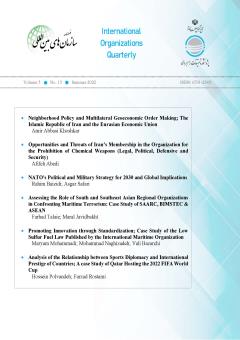Promoting Innovation through Standardization; Case Study of the Low Sulfur Fuel Law Published by the International Maritime Organization
Subject Areas : Politics1 , Mohammad Naghizadeh 2 , Vali Bazarchi 3
1 -
2 - Allameh Tabataba’I University
3 -
Keywords: Policy making, standardization, International Maritime Organization,
Abstract :
The impact of rules and standards to stimulate innovation in organizations has been the subject of various articles and research since the early 1990s. Identifying the types of standards and their impact mechanism on innovation through public policies has been addressed in this study. In this line, by using library studies, at first, innovation and innovation policy are defined and then, the relationship between types of standards with innovation and the impact of regulation with various types of standards are examined. In the case study of "the standard of using low sulfur fuel has become mandatory from the beginning of 2020 in the shipping industry"; the structure of the International Maritime Organization (IMO) and the steps of converting a proposal into a standard in this organization are described. Finally, by applying the qualitative method and interviewing experts, the various solutions offered by countries and large companies in various industries to comply with this standard were analyzed. Solutions such as the use of marine diesel and low-sulfur fuels, the use of low-sulfur fuel mixtures, the installation of Scrubber of gas emission units in ships, the use of natural gas or the use of other marine fuels such as methanol and Biomass fuel was placed in the hands of research and development units in various refining, chemical, nano and polymer industries. These solutions require a variety of innovations in product and process technologies at different levels. This case study shows that a global standardization is effective in a variety of innovation methods and can shape the future development of countries and companies.
قاضی نوری، سید سپهر. قاضی نوری، سید سروش (2012). سیاستگذاری علم و فناوری در قالب سیاستهای عام و خاص. رهیافت (22)، صص 5-20.
رستگاری، مهدی (1398). ۱۸۰۰ میلیارد دلار هزینه، ۷۰۰۰ میلیارد دلار صرفهجویی / بررسی ابعاد مثبت و منفی پیشگیری از تغییر اقلیم. پیام دریا (256)، صص20-23.
محبی، علیرضا (1397). چرا تولید سوخت کمسولفور در داخل کشور مهم است؟ پیام دریا (256), صص 4-6.
مرکز توسعه فناوری برق و انرژی ایران، دسترسی در http://www.eptp.ir/fa/Default.aspx?tabid=1239.
قانون برنامه پنجساله پنجم توسعه جمهوری اسلامی ایران (1394 ـ 1390)، تاریخ ابلاغ: ۳۰/۱۰/ ۱۳۸۹، شماره ابلاغیه: 73285/419، سال: 1389، https://rc.majlis.ir/fa/law/show/790196.
قانون برنامه پنجساله ششم توسعه جمهوری اسلامی ایران (۱۴۰۰- ۱۳۹۶) تاریخ ابلاغ: ۱۶/۱/ ۱۳۹۶ شماره ابلاغیه: ۱۰۴۲ (مصوب ۱۴/۱۲/۱۳۹۵ مجلس شورای اسلامی) https://rc.majlis.ir/fa/law/show/1014547.
قاسمیان، سلیمان، آتشفراز، مهرنوش (1398). بررسی آثار اجرای مقررات جدید سازمان جهانی دریانوردی موسوم به IMO ۲۰۲۰ بر بازارهای جهانی نفت خام و فراوردههای نفتی و صنعت پالایش نفت جهان و ایران، گزارش مرکز پژوهشهای مجلس، 16722، https://rc.majlis.ir/fa/report/show/1351773
Archibugi, D., & Lundvall, B.-A. (2001). The Globalizing Learning Economy,. Oxford University Press.
Berger, F., Blind, K., & Thumm, N. (2012). Filing behaviour regarding essential patents in industry standards. Research Policy, 41(1), 216-225.
Blind, K. (2013). The Impact of Standardization and Standards on Innovation. Nesta Working Paper www.nesta.org.uk/wp13-15, TU Berlin, Rotterdam,School of Management and Fraunhofer FOKUS.
Blind, knut (2008). "Regulatory foresight: Methodologies and selected applications." Technological Forecasting & Social Change 75 20.
Blind, k., Petersen, S. S., & Riillo, C. A. (2017). The impact of standards and regulation on innovation in uncertain markets. Research Policy, 46(1), 249-264.
Blind, K. I. E., Jakob, Cunningham, Paul, Gök, Abdullah, Shapira, Philip (Eds.). (2016).450–482. The impact of regulation on innovation.
Carlsson, B., & Stankiewicz, R. (1991). On the nature, function and composition of technological systems. J. Evol. Econ, 1 (2), 93–118.
Featherston, C. R., Ho, J.-Y., Brévignon-Dodin, L., & O'Sullivan, E. (2016). Mediating and catalysing innovation: A framework for anticipating the standardisation needs of emerging technologies. Technovation, 48, 25-40.
Goluchowicz, K. and K. Blind (2011). "Identification of future fields of standardisation: An explorative application of the Delphi methodology." Technological Forecasting and Social Change 78(9): 1526-1541.
Hauknes, J., & Nordgren, L. (1999). Economic rationales of government involvement in innovation and the supply of innovation-related services.
Ho, J.-Y., & O'Sullivan, E. (2017). Strategic standardisation of smart systems: A roadmapping process in support of innovation. Technological Forecasting and Social Change, 115, 301-312.
Jaegul Leea, Francisco M. Velosob,c,1, David A. Hounshell. (2011). Linking induced technological change, and environmental regulation: Evidence from patenting in the U.S. auto industry. research policy, 40, 12.
Lundvall, e.-Å., & Borrás, S. (2005). Science, technology and innovation policy. The Oxford handbook of innovation, 599-631.
Lundvall, B.-A. (1992). "National Systems of innovation: Towards a theory of innovation and interactive learning." Pinter, London,- 317.
Maclachlan, M. (2004). The shipmaster's business companion.
Meltz, R., & Copeland, C. (2013). The Wetlands Coverage of the Clean Water Act (CWA): Rapanos and Beyond. Congressional Research Service.
M.-A, F.-R. (2004). Définition du droit de la régulation économique. Recueil Dalloz(2), 126-139.
Nelson, R. R. (1995). Recent evolutionary theorizing about economic change. Journal of economic literature, 33(1).
OECD (2004). " ISO/ IEC Guide, Standardization and related activities General vocabulary." OECD publishing
Smith, A. D. (1999). Myths and Memories of the Nation, Oxford University Press Oxford.
Smith, K. (1997). "Economic infrastructures and innovation systems." Systems of Innovation: Technologies, institutions and organizations: 86-106 ….
Wiegmann, P. M., de Vries, H. J., & Blind, K. (2017). Multi-mode standardisation: A critical review and a research agenda. Research Policy, 46(8), 1370-1386.
https://www.imo.org/en/MediaCentre/PressBriefings/pages/02-IMO-2020.aspx
باشگاه خبرنگاران جوان، 1400، مصاحبه با محمدرضا راوند دبیر اجرایی انجمن صنعت بانکرینگ ایران، پاسکاری پمپبنزینهای دریایی میان دو وزارتخانه / توسعه صنعت «بانکرینگ» چگونه تحریمها را کماثر میکند؟ دسترسی در: https://www.yjc.news/00XNru
خبرگزاری سازمان بنادر و دریانوردی ایران، 1398، یادداشت رؤیا امام: الزام کشتیها به استفاده از سوخت کمگوگرد از سال ۲۰۲۰، دسترسی در: https://www.pmo.ir/fa/news/46214


